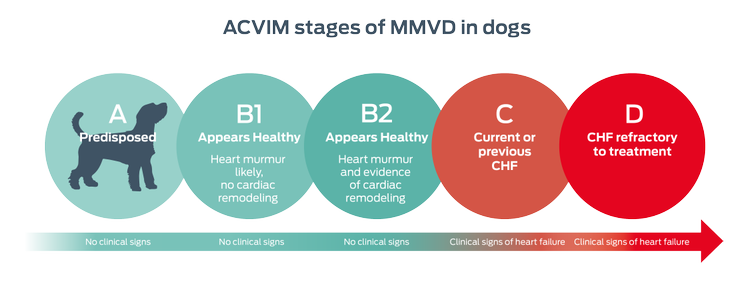
Meet BENNY
A 5-year-old, neutered male Chihuahua
- Benny is presented for a routine physical examination and vaccinations.
- Benny eats about ½ cup of a high-quality dry dog food that is split into two meals. He also gets a couple of small treats daily. While Benny does not receive table scraps, he does get an occasional bite-size piece of watermelon, which he enjoys.
- Benny weighs 4.1 kg (9 lbs.) with a body condition score of 5/9 and normal muscle mass.
- On exam, Benny is bright, alert, and responsive. He has no coughing or wheezing, and lungs sounds are normal. On auscultation, a grade III/VI systolic murmur is heard over the left heart apex. Heart rate and rhythm are normal. The rest of Benny’s exam is unremarkable.
Cardiovascular Disorders
Dietary Management of Myxomatous Mitral Valve Disease (MMVD)
Myxomatous mitral valve disease (MMVD) is the most common heart disease in dogs. Current nutritional guidelines focus on recommendations for dogs after they show evidence of cardiac changes. New research demonstrates that a blend of nutrients, the cardiac protection blend (CPB), may help improve heart function in the early stages of disease, before dogs show signs of heart failure.


Key Messages
- Myxomatous mitral valve disease (MMVD) is the most common cause of acquired canine heart disease.1-3
- In North America, MMVD accounts for approximately 75% of canine heart disease.1
- Most affected dogs are older, small breed dogs weighing less than 20 kg, although MMVD can also occur in larger dogs.1,4

- Dogs with MMVD appear healthy until they reach later stages of disease. But, internally, the heart is changing even in this preclinical time.1
- MMVD is a slowly progressive disease, but the rate of progression is hard to predict.1
- Approximately 30% of dogs with MMVD progress to advanced disease.2,5
- Current nutritional recommendations focus mainly on managing signs after congestive heart failure starts. A study was done to identify metabolomic differences between dogs with MMVD and healthy controls. Based on this research, a cardiac protection blend (CPB) of nutrients was developed. A internal study indicated that the CPB may help improve heart function in dogs with early stage MMVD.1,6-8
- A 6-month dietary internal study using a diet with the CPB in a complete and balanced diet showed nutrition may play a role in the management of the early stages of MMVD.6
- Metabolomics research showed that the clinical benefits seen in the internal study were associated with positive changes at the molecular level.7,9


Related Tools and Content:
ACVIM Classification of Heart Disease and Heart Failure in Dogs with MMVD
View a short video about the ACVIM classification of heart disease.
Myxomatous Mitral Valve Disease
Discover the science behind a novel nutritional intervention that could transform the management of cardiac health for dogs with early stage MMVD.
Dietary Management of Myxomatous Mitral Valve Disease (MMVD)
A novel nutritional intervention can help improve heart function and slow disease progression in dogs with early stage MMVD.
Dietary management of myxomatous mitral valve disease (MMVD)
Myxomatous mitral valve disease (MMVD) is the most common heart disease in dogs. Learn about specific nutrients that play key roles in cardiac health for dogs with MMVD.
Transforming Heart Health
A novel dietary intervention for dogs with early stage myxomatous mitral valve disease
To Share With Pet Owner:
Nutrition and Heart Health
The heart is a vital organ that relies on specific nutrients and a continuous supply of energy to support and maintain a regular rate and rhythm, yet the role of nutrition in pets’ cardiac health is often overlooked.
References
- Keene, B. W., Atkins, C. E., Bonagura, J. D., Fox, P. R., Häggström, J., Fuentes, V. L., Oyama, M. A., Rush, J. E., Stepien, R., & Uechi, M. (2019). ACVIM consensus guidelines for the diagnosis and treatment of myxomatous mitral valve disease in dogs. Journal of Veterinary Internal Medicine, 33(3), 1127–1140.
- Borgarelli, M., Crosara, S., Lamb, K., Savarino, P., La Rosa, G., Tarducci, A., & Häggström, J. (2012). Survival characteristics and prognostic variables of dogs with preclinical chronic degenerative mitral valve disease attributable to myxomatous degeneration. Journal of Veterinary Internal Medicine, 26(1), 69–75. doi: 10.1111/j.1939-1676.2011.00860.x.
- Buchanan, J. W. (1977). Chronic valvular disease (endocardiosis) in dogs. Advances in Veterinary Science, 21, 57–106.
- Parker, H. G., & Kilroy-Glynn, P. (2012). Myxomatous mitral valve disease in dogs: Does size matter? Journal of Veterinary Cardiology, 14(1), 19–29. doi:10.1016/j.jvc.2012.01.006
- Borgarelli, M., & Häggström, J. (2010). Canine degenerative myxomatous mitral valve disease: Natural history, clinical presentation and therapy. Veterinary Clinics of North America: Small Animal Practice, 40, 651–663.
- Li, Q., Heaney, A., Langenfeld-McCoy, N., Boler, B. V., & Laflamme, D. P. (2019). Dietary intervention reduces left atrial enlargement in dogs with early preclinical myxomatous mitral valve disease: A blinded randomized controlled study in 36 dogs. BMC Veterinary Research, 15(1), 425. doi: 10.1186/s12917-019-2169-1
- Li, Q., Laflamme, D. P., & Bauer, J. E. (2020). Serum untargeted metabolomic changes in response to diet intervention in dogs with preclinical myxomatous mitral valve disease. PloS One, 15(6), e0234404. doi: 10.1371/journal.pone.0234404
- Li, Q., Freeman, L.M. Rush, J.E., Huggins, G.S., Kennedy, A.D., Labuda, J.A., Laflamme, D.P., & Hannah, S.S. Veterinary medicine and multi-omics research for future nutrition targets: metabolomics and transcriptomics of the common degenerative mitral valve disease in dogs. (2015). OMICS, 19(8): 461-470. doi: 10.1089/omi.2015.0057
- Li, Q., Larouche-Lebel, E., Loughran, K. A., Huh, T. P., Suchodolski, J. S., & Oyama, M. A. (2021). Metabolomics profiling analysis reveals deranged energy metabolism and amino acid metabolic reprogramming in dogs with myxomatous mitral valve disease. Journal of the American Heart Association, 10(9), e018923. doi: 10.1161/JAHA.120.018923.